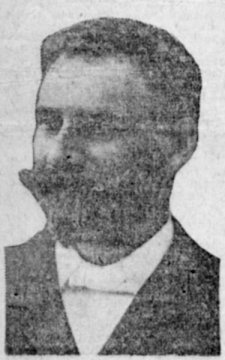LVRG Scrapbook — Thursday, March 05, 2009:
100 years ago: “Mr. Max Hirsch. An appreciation”
BY MR R. MURRAY SMITH, C.M.G.*
One of the most intimate friends of the late Mr Max Hirsch was Mr R. Murray Smith, C.M.G., who was asked to-day to say something about Mr Hirsch, as he appeared to his friends.
“It gives me great pleasure to say something in eulogy of my old and very dear friend, the late Mr Max Hirsch. He was a man of many parts, and, as you know, was industrious in many directions. He was also a man who, it seemed to me, preferred knowledge to the acquisition of wealth. His tastes were simple.
“One of the principal characteristics of Mr Hirsch was the power he had of causing a feeling of personal attachment in the minds of all those who knew him. Sir Charles Fox, you may remember, once said that his party was small, but every member of it would die for him. Comparing great things with small, Mr Hirsch might have made a similar remark with reference to himself and the members of his party.
“He was a man of brilliant intellectual powers and of unwearying industry. Although we sometimes differed very strongly on subjects discussed by us, this opposition never had the slightest effect on our friendship, nor upon the feeling of admiration which I had for him.

THE LATE MR MAX HIRSCH.*
“Mr Hirsch was a man of severely logical perceptions, but was uniformly courteous. He was exceedingly skilful in debate, and, as everybody knows, was one of the foremost advocates of fretrade [sic], and a prominent single-taxer. I agreed with him on the subject of free trade, but not as to the single tax system. But I always admired the man and his methods.
“While he was a perfect master of idiomatic English, a slight foreign accent gave an additional piquancy to his addresses.
“Perhaps his most brilliant effort was that made in his debate at the Athenæum Hall with Mr Morton Frewen, a representative of great silver interests in America, on the subject of bi-metallism. After a most triumphant argument in support of the orthodox creed of mono-metallism, which Mr Frewen sought in vain to adequately reply to, Mr Hirsch, his hair bristling, rushed to the front of the platform, and exclaimed, in his vivacious manner:
“ ‘Well, if that is all Mr Frewen has to say, all I have to add is, that Mr Frewen is not a bi-metallist.’
“Mr Hirsch had not only utterly routed his opponent and dismayed the friends of bi-metallism, but had also shown great forbearance until the conclusion of the exciting debate. When he had made the remark quoted just now, the audience roared with laughter.
“The brilliant work done by Mr Max Hirsch in many avenues of intellectual activity is so well known that I need not call attention to it in detail. I can only repeat that all his friends admired him greatly, and that his charm of manner was so great that friendship was never alienated by personal differences.
“I might, perhaps, add that Mr R. J. Jeffrey, who took charge of the publication in England of Mr Hirsch's book, Democracy versus Socialism, was charmed with the author when he met him in Australia. In fact, he charmed everybody who came in contact with him. Democracy versus Socialism has become known everywhere, and is, I believe, one of the text books at the University of Japan for the Bachelor of Arts course.
“It will be long before a more brilliant man, and one of more widely diversified interests, than the late Mr Max Hirsch appears on the horizon.”
__________
* The Herald (Melbourne), Mar.5, 1909. Posted Jan.5, 2010.



